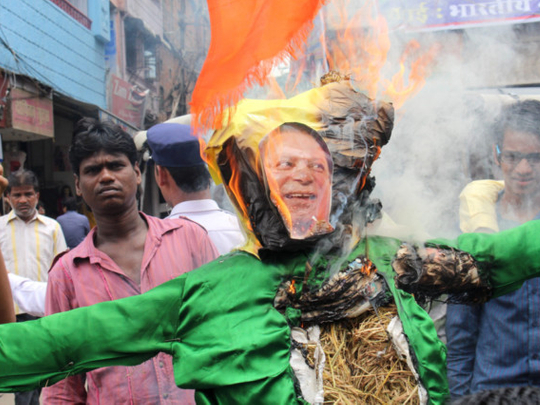
The Pakistan army’s role in steering the country beyond the ongoing political turmoil triggered by protests in Islamabad has increasingly made the rounds in the past week as Prime Minister Nawaz Sharif struggles to save his beleaguered government.
References by Sharif’s supporters to the “establishment’s role” in backing the demonstrations led by former cricketer Imran Khan and Islamic scholar Tahirul Qadri have obviously made a point; that the army is seeking to destabilise Sharif and other members of the elected order. For years, the term ‘establishment’ in Pakistan has been widely used and accepted as an oblique yet upfront reference to the army and its allies within the governance structure and elements of the private sector.
Yet, the answer to the riddle of exactly who is doing what to whom in Pakistan’s politics may just be locked more in nuances than simply a group of senior generals calling the shots.
Indeed its true that Pakistan has remained under the military’s rule for almost half of its life as an independent state — a history that continues to shroud the interpretation of present-day events. While history is a fact of life which cannot be ignored, it is equally true that trends surrounding present-day Pakistan are more complex. As the crisis unfolds in Islamabad, Sharif has much to account for in terms of his own deeds rather than elements of history.
The continuing protests have followed a number of key mishandlings by Sharif’s regime. The drama that continues in Islamabad began more than two months ago in Lahore, Sharif’s main power centre in the Punjab province.
On June 17, the police there shot scores of protestors loyal to Qadri.
The altercation began when the provincial administration of the Punjab led by Shahbaz Sharif, the prime minister’s younger brother, ordered the removal of a security gate placed outside Qadri’s home.
In a clash that followed a confrontation, more than 100 of Qadri’s followers were injured while up to 15 were killed. Subsequently, the younger Sharif’s administration first took the position that he was completely unaware of the unfolding and bloody drama, notwithstanding the vivid and continuous coverage of those events on practically every Pakistani TV channel, which spread its minute details far and wide.
But to make matters worse, the ruling structure has kept on refusing Qadri’s demand for the registration of a police case against officials of the Punjab government including the younger Sharif.
Though the report had to be followed by a comprehensive investigation that essentially meant that any charges against the chief minister were easily reversible in a subsequent probe, the regime consistently defied the call. This only added to Qadri’s rage and eventually may have done much to lead him to Imran’s planned protest in Islamabad over allegations of electoral fraud in the 2013 parliamentary elections.
Electoral fraud
Like Qadri, Imran’s response came after he was badly stung by Sharif’s repeated refusal to allow an independent investigation into the alleged electoral fraud. Though Imran insisted there was widespread fraud, he asked for a thorough investigation in just four of the 342 constituencies from the lower house of parliament known as the national assembly.
Consequently, it’s hardly surprising that the cricket star turned politician had chosen to storm Islamabad backed by thousands of his well organised and charged up followers.
The emerging storm has become Sharif’s biggest political challenge, just a year after he became the prime minister in a landmark political event. During this period, the prime minister’s southwards journey in a political sense has been fuelled by his regime’s failure to deal with political matters in a democratic manner.
Meanwhile, on other fronts, Sharif’s choice of pressing ahead with charges of high treason against General Pervez Musharraf, the former army chief, hasn’t helped him solidify his position. The two men have a far from stable personal history. The prime minister was removed in a 1999 military coup led by Musharraf and forced into more than seven years of exile in Saudi Arabia.
Rather than move beyond that personal history, Sharif’s actions have clearly suggested that he remains obsessed with settling an old score. This hardly helps to run a smooth ship at a time when the Pakistan army remains the only force on the frontlines fighting Taliban militants across the restive and conflict-stricken belt along the country’s border with Afghanistan.
And last but not least, Sharif’s peculiar pursuit of economic policies has only eroded confidence in his regime’s ability to steer Pakistan out of its multiple crises.
In a country where more than 40 per cent of the population lives below the poverty line, and at a time when widespread energy shortages practically haunt every home, the government’s preferred choices lie elsewhere.
In just over a year in office, the prime minister has squarely focused on overseeing fancy new infrastructure projects such as roads and transport mechanisms, ignoring a much needed focus on tackling economic mayhem that lies elsewhere.
Faced with formidable odds mainly of his own making, Sharif may or may not survive. In the ultimate analysis, its possible that the Pakistan army may have a role in steering the country out of its prevailing crisis.
But evidence available all around easily suggests that events during Sharif’s tenure have squarely led to the present-day crisis in Pakistan’s capital rather than a sinister conspiracy hatched by influential army generals seeking to curb democratic civilian rule.
Farhan Bokhari is a Pakistan-based commentator who writes on political and economic matters.









